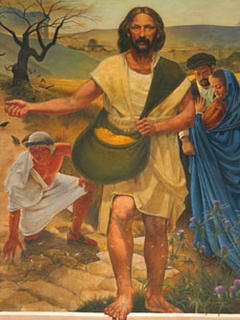But some seed fell on rich soil, and produced fruit,
a hundred or sixty or thirtyfold.
a hundred or sixty or thirtyfold.

What are parables?
The word parable (Hebrew mashal; Syrian mathla, Greek parabole) signifies in general a comparison, or a parallel, by which one thing is used to illustrate another. It is a likeness taken from the sphere of real, or sensible, or earthly incidents, in order to convey an ideal, or spiritual, or heavenly meaning.
Its Greek designation (from paraballein to throw beside or against) indicates a deliberate "making up" of a story in which some lesson is at once given and concealed.
the New Testament parables have each a definite meaning, to be ascertained from the explanation, where Christ deigns to give one, as in the sower; and when none such is forthcoming, from the occasion, introduction, and appended moral.
(Catholic Encyclopedia)
Background of the Parable
About the weeds that have thorns. When we visited the Dominus Flevit Church in the year of the Great Jubilee I saw a plant with long sharp thorns. They look like the 'aroma' tree here in the Philippines. Gosh, if that was the tree from which the crown of thorns was made, I couldn't imagine the pain suffered by Jesus.
Message of the Parable
No comments:
Post a Comment